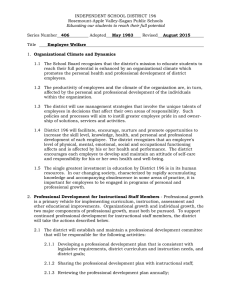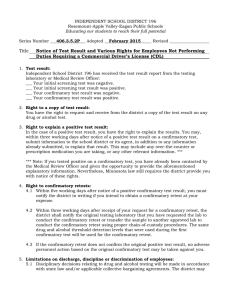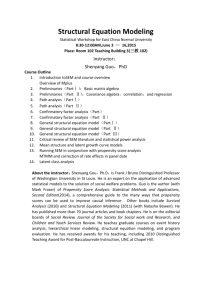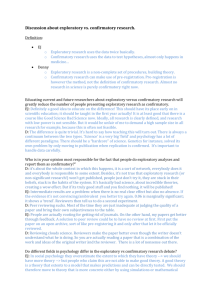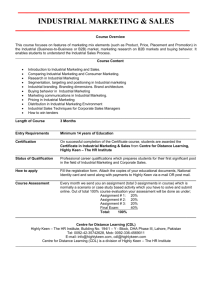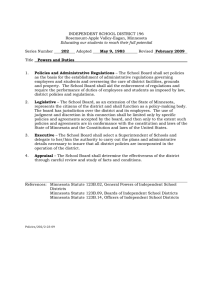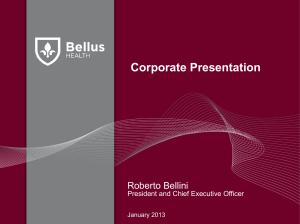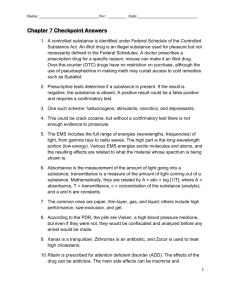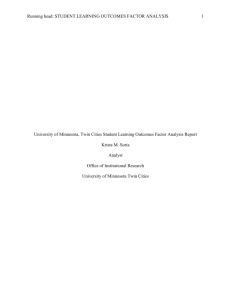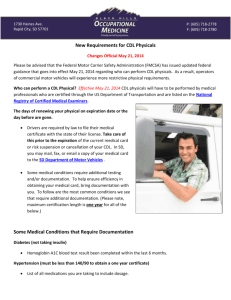Alcohol and Drug Testing of Employees Not Performing Duties Requiring... 1. Commercial Driver’s License (CDL)
advertisement
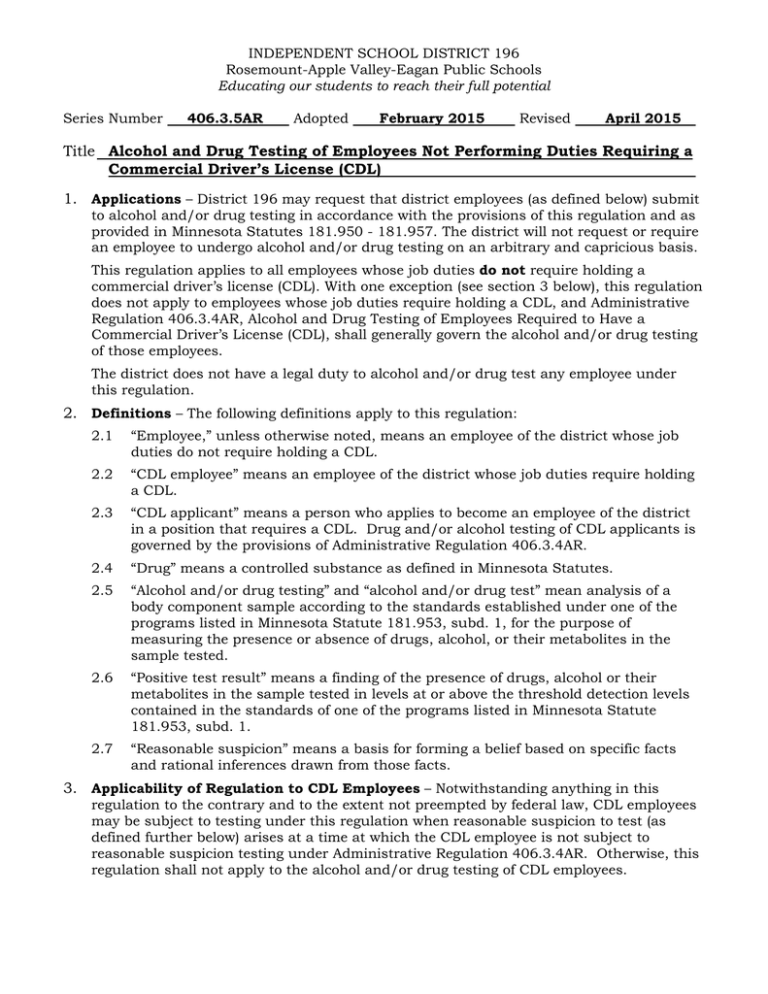
INDEPENDENT SCHOOL DISTRICT 196 Rosemount-Apple Valley-Eagan Public Schools Educating our students to reach their full potential Series Number 406.3.5AR Adopted February 2015 Revised April 2015 Title Alcohol and Drug Testing of Employees Not Performing Duties Requiring a Commercial Driver’s License (CDL) 1. Applications – District 196 may request that district employees (as defined below) submit to alcohol and/or drug testing in accordance with the provisions of this regulation and as provided in Minnesota Statutes 181.950 - 181.957. The district will not request or require an employee to undergo alcohol and/or drug testing on an arbitrary and capricious basis. This regulation applies to all employees whose job duties do not require holding a commercial driver’s license (CDL). With one exception (see section 3 below), this regulation does not apply to employees whose job duties require holding a CDL, and Administrative Regulation 406.3.4AR, Alcohol and Drug Testing of Employees Required to Have a Commercial Driver’s License (CDL), shall generally govern the alcohol and/or drug testing of those employees. The district does not have a legal duty to alcohol and/or drug test any employee under this regulation. 2. Definitions – The following definitions apply to this regulation: 2.1 “Employee,” unless otherwise noted, means an employee of the district whose job duties do not require holding a CDL. 2.2 “CDL employee” means an employee of the district whose job duties require holding a CDL. 2.3 “CDL applicant” means a person who applies to become an employee of the district in a position that requires a CDL. Drug and/or alcohol testing of CDL applicants is governed by the provisions of Administrative Regulation 406.3.4AR. 2.4 “Drug” means a controlled substance as defined in Minnesota Statutes. 2.5 “Alcohol and/or drug testing” and “alcohol and/or drug test” mean analysis of a body component sample according to the standards established under one of the programs listed in Minnesota Statute 181.953, subd. 1, for the purpose of measuring the presence or absence of drugs, alcohol, or their metabolites in the sample tested. 2.6 “Positive test result” means a finding of the presence of drugs, alcohol or their metabolites in the sample tested in levels at or above the threshold detection levels contained in the standards of one of the programs listed in Minnesota Statute 181.953, subd. 1. 2.7 “Reasonable suspicion” means a basis for forming a belief based on specific facts and rational inferences drawn from those facts. 3. Applicability of Regulation to CDL Employees – Notwithstanding anything in this regulation to the contrary and to the extent not preempted by federal law, CDL employees may be subject to testing under this regulation when reasonable suspicion to test (as defined further below) arises at a time at which the CDL employee is not subject to reasonable suspicion testing under Administrative Regulation 406.3.4AR. Otherwise, this regulation shall not apply to the alcohol and/or drug testing of CDL employees. Regulation 406.3.5AR Page 2 4. Testing Bases – District 196 employees may be subject to alcohol and/or drug testing in the following circumstances, in accordance with Minnesota Statute 181.951. District 196 may request or require an employee to undergo alcohol and/or drug testing if the district has reasonable suspicion based on specific facts and inferences that the employee: 5. 4.1 Is under the influence of alcohol or drugs; 4.2 Has violated Policy 406, section 3, Chemical-Free Workplace, incorporated by reference herein; 4.3 Has sustained a personal injury as defined by Minnesota Statute 176.011, subd. 16, Personal injury, or caused another employee to sustain a personal injury, or 4.4 Has caused a work-related accident or was operating or helping to operate machinery, equipment, or vehicles involved in a work-related accident. Testing Methods and Types of Drugs Tested 5.1 Alcohol and/or drug testing will be done by analysis of a body component sample by a licensed or accredited laboratory as required by Minnesota Statute 181.953, subd. 1. District 196 and the approved testing facility shall follow the chain-ofcustody procedures outlined in Minnesota Statute 181.953, subds. 3 and 5, to ensure proper record keeping, handling, labeling and identification of the samples to be tested. The district’s chain-of-custody procedures shall include the following: 6. 5.1.1 Possession of a sample must be traceable to the employee from whom the sample is collected, from the time the sample is collected through the time the sample is delivered to the laboratory; 5.1.2 The sample must always be in the possession of, must always be in view of, or must be placed in a secured area by a person authorized to handle the sample; 5.1.3 A sample must be accompanied by a written chain-of-custody record, and 5.1.4 Individuals relinquishing or accepting possession of the sample must record the time the possession of the sample was transferred and must sign and date the chain-of-custody record at the time of transfer. 5.2 The drugs for which employees will be tested are marijuana (THC metabolite), cocaine, amphetamines, opiates (including heroin) and phencyclidine (PCP). 5.3 A laboratory shall retain and properly store for at least six months all samples that produced a positive result. Notification of Testing Regulation 6.1 The district will provide written notice of this alcohol and drug testing regulation to all affected employees upon adoption of the regulation and to a previously nonaffected employee upon transfer to an affected position under the regulation. 6.2 A notification of the alcohol and drug testing regulation will be posted in an appropriate and conspicuous location at each site and a copy of this policy will be available for inspection during regular business hours at each site. Regulation 406.3.5AR Page 3 7. 8. Employee Rights 7.1 An employee has the right to refuse testing, but the refusal by an employee to take a required test will be documented by the employee’s supervisor and appropriate disciplinary action will be taken in accordance with state law and/or applicable collective bargaining agreements. The employee may also be limited in the job duties assigned to the employee. 7.2 Before requesting an employee undergo alcohol and/or drug testing, the district will provide the employee with District Procedure 406.3.5.1P, Pre-test Acknowledgement Form for Employees Not Performing Duties Requiring a Commercial Driver’s License (CDL), on which to acknowledge that the employee has seen the district’s drug and alcohol testing policy. 7.3 If an employee tests positive for alcohol and/or drug use, the district or its agent will provide to the employee District Procedure 406.3.5.2P, Notice of Test Result and Various Rights for Employees Not Performing Duties Requiring a Commercial Driver’s License (CDL), stating their test result and their rights according to Minnesota Statutes. The procedure states that the employee has the right to explain the positive test. The district or its agent may request the employee indicate any over-the-counter or prescription medication the individual is currently taking or has recently taken and any other information relevant to the reliability of, or explanation for, a positive test result. 7.4 Within three working days of a positive test result on a confirmatory test, the employee may submit information to the district or its agent, in addition to any information already submitted under section 7.3 above, to explain that result, or may request a confirmatory retest of the original sample at the employee’s expense as provided in Minnesota Statute 181.953, subd.9. Test Results 8.1 The testing laboratory shall disclose to the district or its agent a written test result report for each sample tested within three working days after a negative test result on an initial screening test or when the initial screening test produced a positive test result, within three working days after a confirmatory test. A test report must indicate the alcohol, drugs or alcohol or drug metabolites tested for and whether the test produced positive or negative results. 8.2 Within three working days after receiving a test result report, the district or its agent shall notify the tested employee of the result and the employee’s applicable rights using District Procedure 406.3.5.2P, Notice of Test Result and Various Rights for Employees Not Performing Duties Requiring a Commercial Driver’s License (CDL). These rights include the right to receive the test results and, for an employee who tests positive on a test, the rights provided in sections 7.3, 7.4, 8.3 and 9 of this regulation. 8.3 Confirmatory retests – The testing laboratory shall conduct a confirmatory test on all samples that produced a positive test result on an initial screening test. After notice of a positive test result on a confirmatory test, an employee may request a confirmatory retest of the original sample at the employee’s expense. 8.3.1. Within five working days after notice of the confirmatory test result, the employee shall notify the district or its agent in writing of the employee’s intention to obtain a confirmatory retest. Regulation 406.3.5AR Page 4 9. 8.3.2. Within three working days after receipt of the notice, the district or its agent shall notify the original testing laboratory that the employee has requested the lab to conduct the confirmatory retest or transfer the sample to another approved lab to conduct the confirmatory retest using proper chain-ofcustody procedures. The same drug and alcohol threshold detection levels that were used during the first confirmatory test will be used for the confirmatory retest. 8.3.3. If the confirmatory retest does not confirm the original positive test result, no adverse personnel action based on the original confirmatory test may be taken against the employee. Limitations on Employee Discharge, Discipline and Discrimination 9.1 Discipline or discharge decisions under this regulation will be made in accordance with state law and/or applicable collective bargaining agreements. 9.2 The district may not discharge, discipline, discriminate against, or request or require rehabilitation of an employee on the basis of a positive test result from an initial screening test that has not been verified by a confirmatory test. 9.3 The district may not discharge an employee for whom a positive test result on a confirmatory test was the first such result for the employee on an alcohol and/or drug test requested by the district unless the following conditions have been met: 9.3.1 The district has first given the employee an opportunity to participate in, at the employee’s expense or under an employee benefit plan, either a drug or alcohol counseling or rehabilitation program, whichever is more appropriate, as determined by the district after consultation with a certified chemical use counselor or a physician trained in the diagnosis and treatment of chemical dependency, and 9.3.2 The employee has either refused to participate in the counseling or rehabilitation program or has failed to successfully complete the program, as evidenced by withdrawal from the program before its completion or by a positive test result on a confirmatory test after completion of the program. 9.4 Notwithstanding section 9.2, the district may temporarily place the tested employee on paid administrative leave or transfer that employee to another position at the same rate of pay pending the outcome of the confirmatory test and, if requested, the confirmatory retest, provided the district believes that it is reasonably necessary to protect the health or safety of the employee, coworkers, students or the public. An employee must be reinstated if the outcome of the confirmatory test or requested confirmatory retest is negative. 9.5 Notwithstanding section 9.3, the district may impose lesser discipline than discharge, including suspension, for an employee’s first positive test result on a confirmatory test and may propose discharge for a positive test result on a subsequent confirmatory test. 9.6 The district may not discharge, discriminate against, or request or require rehabilitation of an employee on the basis of medical history information revealed to the district pursuant to section 7.3 and 7.4 of this regulation unless the employee was under an affirmative duty to provide the information before, upon, or after hire. Regulation 406.3.5AR Page 5 9.7 An employee must be given access to information in the employee’s personnel file relating to positive test result reports and other information acquired in the alcohol and/or drug testing process and conclusions drawn from and actions taken based on the reports or other acquired information. 10. Confidentiality 10.1 The testing laboratory may only disclose alcohol and/or drug test results to the district or its agent. 10.2 Employee test results are maintained in strict confidentiality by the district (and/or its agent) and the laboratory. Test results and other information acquired in the testing process are private data on individuals and may not be disclosed by the district (and/or its agent) or laboratory to another employer or third-party individual, governmental agency, or private organization without the written consent of the employee. 10.3 Notwithstanding sections 10.1 – 10.2, evidence of a positive test on a confirmatory test may be: 10.3.1 Used in an arbitration proceeding pursuant to a collective bargaining agreement, an administrative hearing under other applicable state or local law, or a judicial proceeding, provided that information is relevant to the hearing or proceeding; 10.3.2 Disclosed to any federal agency or other unit of the United States government as required under federal law, regulation, or order, or in accordance with compliance requirements of a federal government contract; and 10.3.3 Disclosed to a substance abuse treatment facility for the purpose of evaluation or treatment of the employee. 10.4 Positive test results from the alcohol and/or drug testing referred to in this regulation may not be used as evidence in a criminal action against the employee tested. References: - Minnesota Statutes 181.950 – 181.957, Authorized Drug and Alcohol Testing - Minnesota Statute 171.02, subd. 2a, Exception for certain school bus drivers - Minnesota Statute 176.011, subd. 16, Personal injury Regulations/406.3.5AR/12-03-15
